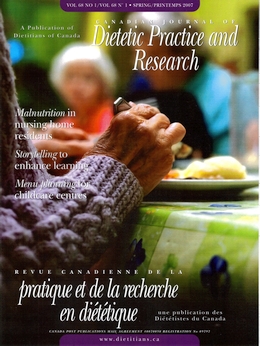Abstract
Purpose: Dietetic internships provide practical experience leading, in most cases, to the attainment of entry-level dietetic competence. Problematic intern performance issues were examined, as were how educators resolve these issues and the supports they require to manage them.
Methods: A survey was electronically distributed to all Dietitians of Canada internship/university course directors (n=57). The response rate was 40% (n=23).
Results: Annually, 61% of internships involve challenging performance issues related to intern knowledge, skills, attitude, and behaviour. These issues manifest themselves individually or in combination as an intern's inability to apply/demonstrate appropriate knowledge/skill, a view/approach to the profession that is not in keeping with the organizational view, an attitude that is in conflict with program values, a negative response to feedback, an inability to relate to others, work habits that are in conflict with program values, and personal attributes that detract from the ability to meet program expectations. Educators respond to these issues by modifying their communications, the learning environment, and the program.
Conclusions: Educators’ strategies could be enhanced through consultation with other educators, mentor training, and the development of formal procedures.
Résumé
Objectif: Les internats en diététique procurent de l'expérience pratique qui conduit, dans la plupart des cas, à l'acquisition d'une compétence en diététique de niveau débutant. Des problèmes de rendement chez les internes ont été examinés, de même que la façon dont le personnel enseignant règle ces problèmes et le soutien dont il a besoin en cette matière.
Méthodes: Un questionnaire a été envoyé par voie électronique à tous les directeurs d'internat et de programmes universitaires membres des Diététistes du Canada (n=57). Le taux de réponse a été de 40 % (n=23).
Résultats: Chaque année, 61 % des internats font face à des problèmes de rendement liés aux connaissances, compétences, attitudes et comportements des internes. Ces problèmes se manifestent individuellement ou en combinaison par l'incapacité de l'interne à appliquer ou démontrer les connaissances ou compétences appropriées, par une idée ou une approche de la profession incompatible avec celle de l'organisation, par une attitude ou des habitudes de travail qui entrent en conflit avec les valeurs du programme, par une réaction négative à la critique, par une incapacité à se lier aux autres et par des caractéristiques personnelles qui l'empêchent de satisfaire aux attentes du programme. Le personnel enseignant réagit à ces problèmes en modifiant les communications, l'environnement d'apprentissage et le programme.
Conclusions: Les stratégies du personnel enseignant pourraient être améliorées par la consultation entre collègues, le mentorat et la mise en vigueur de méthodes rigoureuses.



